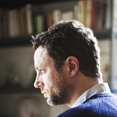
|
We met Sebastiano Mauri, the Italo-Argentinian versatile and charismatic visual artist, graduated in cinema, who faced less than 1 year ago the literature world issuing his first brilliant and acclaimed book “Goditi il problema” (Enjoy the problem), Rizzoli, 2012. Sebastiano opened the door of his eclectic house to the photographer Paul Barbera‘s photo-documentary project “Where They Create”, telling us about his personal and unique life. You are a visual artist, but also a writer, and you worked in cinema too, how do you manage all these different roles together? It depends. Sometimes I dive into a specific project and there’s no room for anything else, it’ll all have to wait. Other times, probably far from any deadline, I manage to work, let’s say, on my screenplay for a couple of hours, structuring, jolting down dialogues, then I might dive into one of my altars, and get lost in painfully slow processes such as composing mosaics or creating flower arrangements made of hundreds of tiny roses, and finally write a few pages of my new novel. As much as I can, I try not to loose touch with any of these activities, so that I keep alert that part of the brain and/or body. But then reality kicks in, and this productive sounding, eclectic schedule is swept away by being unable to stop applying tiny lilacs to Ganesh’s temple, walking the dog who’d do anything not to return home, or answering emails about matters you thought resolved a year ago. Basically you end managing it day by day, the best you can, hoping nobody will realize you don’t have a master plan. I’ve noticed that most of your previous interviews dealt with the countries you are more attached to and your multicultural education, along with your interest in spirituality. Is your creativity related to any special places? What’s the role of religion in your works and in contemporary cultures? I have lived extensively between New York, Milan and Buenos Aires, different languages, very different realities, very far geographically. I wouldn’t say that my creativity relates more to one place than the other, I’d rather think that it is stimulated by the juxtaposition of differences. Change per se is a great tool to put things into perspective, reconsider your habits and even beliefs. Movement, doubt and fluidity have become the greatest influence on my work. In the past four or so years, religion has been the main subject of my research. I look for similarities between the different credos, a common space where we’re all welcome, and that does not invite judgement, conflict or exclusion. Still today, religion can offer a great deal of comfort in the form of psychological support, social interaction with like-minded people, stress releasing mantra practices, recurring rituals that break our habits, making us concentrate for a moment on something that isn’t our daily schedule, something that might be greater than us. The goal is, like with everything else, to take what is good, positive, life enriching of this experience, and leave out all that separates us, that makes us feel different from one another, that brings judgement and cultural isolation. My (good) God against your (bad) God, the Geroge W. Bush view of the world. Religion can be the opium of the people, but it can also be a caress, a held hand, a shoulder to cry onto, an ear to talk to. Not something to look down onto. Do you think that human beings still need amulets or icons to believe, or do faith and firm belief stand alone? In the age of digital reproduction of images and globalized production of goods, amulets and icons are seen, distributed and sold now more than ever. Faith and firm belief need help from the marketing department like anything else. Do you think that sexuality can still offer original food for thought and research? Anything that has to do with our daily lives is always going to be original and nurturing food for thought. Our lives are engaged in a daily duel between habit and innovation: our reading of them is forced to constantly adapt. It will never arrive a final word on human nature. I’d say that the telling of hidden details, as far as I am concerned, has to do with the attempt to share thoughts and facts that one is naturally (and unhealthily I might add) drawn to keep to oneself. I have found that if you dare open up to others, most probably that’s exactly what they will do with you. A liberating act. |